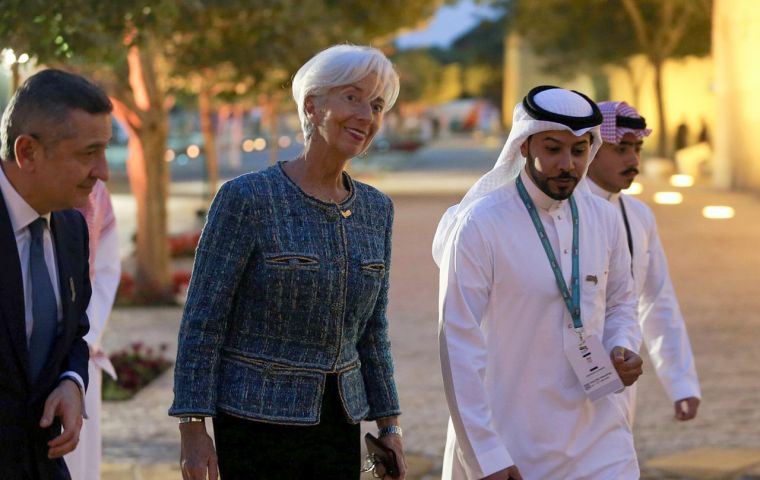MercoPress. South Atlantic News Agency
Leading central bankers, UK, EU and Japan, discuss how to reach the 2% inflation elusive target
 The meeting in Riyadh allowed Fed chairman Jerome Powell, ECB President Ms Lagarde and Bank of Japan Governor Haruhiko Kuroda to compare notes.
The meeting in Riyadh allowed Fed chairman Jerome Powell, ECB President Ms Lagarde and Bank of Japan Governor Haruhiko Kuroda to compare notes.  Inflation can be destructive if prices rise too fast but a moderate pace, such as 2%, is seen as needed to enable companies to raise wages and create a virtuous cycle
Inflation can be destructive if prices rise too fast but a moderate pace, such as 2%, is seen as needed to enable companies to raise wages and create a virtuous cycle Central bankers from the United States, Japan and the euro zone meeting in the desert kingdom of Saudi Arabia this weekend had their own shifting sands to cross – those of elusive inflation.
The problem facing all three is that price growth has long stopped behaving as expected, as aging populations and technological advances prevent inflation from meeting their cherished 2% target despite aggressive stimulus measures.
This is leading to a deep rethink by the world's most powerful central banks, starting from how they define their goal and what tools they use to achieve it - a process that was becoming even more urgent as the world braced for the economic fallout of the coronavirus outbreak.
The meeting of finance leaders from the world's 20 top economies in Riyadh provided a chance for Federal Reserve Chairman Jerome Powell, ECB President Christine Lagarde and Bank of Japan Governor Haruhiko Kuroda to compare notes.
“The major central banks all face similar problems, including how to deal with another economic downturn,” said an executive of one of the banks present at the G20 meeting.
“They've been discussing this topic for a while. It's about time they come up with some form of conclusion,” he said on condition of anonymity due to the sensitivity of the matter.
Kuroda has plenty of lessons to offer on the dangers of keeping subdued price growth unattended for too long. He deployed a heavy dose of stimulus in 2013, only to see inflation stagnate at levels well below its 2per cent target.
Mindful of such dangers, the Fed is in the midst of its framework review that focuses on how it should pursue 2% inflation using tools such as forward guidance.
In its own review, the ECB is all but certain to overhaul its inflation goal, defined as a rate of price growth “below but close to 2%” to signal it does not see that level as a ceiling.
Inflation can be economically and politically destructive if prices rise too fast but a moderate pace, such as 2%, is seen as needed to enable companies to raise wages and create a virtuous cycle for the economy.
Critics doubt whether tweaks to the definition of price goals would be effective in battling headwinds from demographics and technological innovation.
Older populations tend to consume less while new technologies foster greater efficiency at a lower cost. Together they can be powerful forces leaning against inflation.
To tackle this, the Fed has looked into ideas such as a “make up strategy,” under which a central bank promises to allow inflation to run above target to make up for times of weakness in the economy.
But that would tie the hands of future policymakers - a risky strategy. “It works beautifully in models,” Thomas Barkin, president of the Federal Reserve Bank of Richmond. “It makes me nervous in practice.”
Many BOJ officials, too, are wary of doing another framework review and doubt any tweak to the inflation target will help people believe more strongly that prices will rise.
“There are doubts within the BOJ on whether pledging to achieve higher inflation could change public perceptions dramatically, especially if inflation is still distant from the current target,” said a source familiar with its thinking.
With no clear breakthrough on other tools central banks have at their disposal, managing public expectations is now among their strongest weapons.
And yet the rising cost of prolonged low interest rates, from soaring property prices to vanishing returns for pension funds, means central banks cannot just stand by hoping inflation will perk up some day.
“The side effects are more acute now and I think we should tone down our communication that benefits far outweigh the costs,” an ECB policymaker said on condition of anonymity.
Rejecting the idea that interest rates could stay low forever, IMF Managing Director Kristalina Georgieva likened policymakers' complacency to a frog who doesn't realize it is swimming in gradually heating water until it is too late.
“This is the risk that we are facing,” she told a conference this week held on the sidelines of the G20 meeting. “That an incremental pileup of debt in a low interest environment doesn't give us a good signal to ... jump out of the boiling water.”




Top Comments
Disclaimer & comment rulesCommenting for this story is now closed.
If you have a Facebook account, become a fan and comment on our Facebook Page!